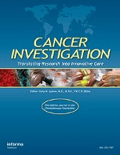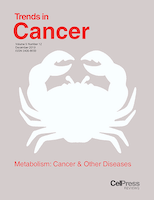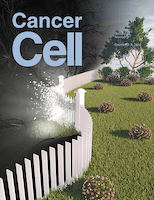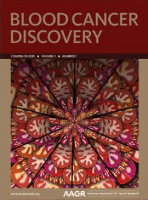
Nature Cancer
Scope & Guideline
Exploring the Complexities of Cancer Treatment
Introduction
Aims and Scopes
- Cancer Immunotherapy:
Research on various immunotherapy strategies, including CAR T cells, immune checkpoint inhibitors, and bispecific antibodies, aimed at enhancing the immune system's ability to fight cancer. - Tumor Microenvironment:
Studies examining the interactions between tumor cells and their surrounding microenvironment, including the role of immune cells, fibroblasts, and extracellular matrix in tumor progression and therapy resistance. - Genomics and Precision Medicine:
Exploration of genomic alterations in cancer, including the identification of actionable mutations and the development of personalized therapeutic strategies based on genetic and molecular profiling. - Metabolism and Cancer:
Investigations into the metabolic vulnerabilities of cancer cells and how metabolic pathways can be targeted to improve treatment efficacy and patient outcomes. - Clinical Trials and Translational Research:
Reports on clinical trial findings, including novel therapeutic agents and combinations, as well as studies that bridge laboratory findings with clinical applications. - Artificial Intelligence in Cancer Research:
Utilization of AI and machine learning techniques to analyze large datasets, predict treatment responses, and improve diagnostic accuracy in oncology.
Trending and Emerging
- Combination Immunotherapy Strategies:
There is a growing emphasis on combining different immunotherapeutic approaches, such as checkpoint inhibitors with CAR T-cell therapy or targeted agents, to enhance antitumor responses and address resistance. - Single-Cell and Multi-Omics Approaches:
Research utilizing single-cell sequencing and multi-omics analyses is on the rise, providing deeper insights into tumor heterogeneity, immune microenvironments, and the intricacies of treatment responses. - Targeting the Tumor Microenvironment:
Increasing attention is being given to strategies that modify the tumor microenvironment, including targeting stromal cells and immune suppressive pathways to improve therapeutic outcomes. - Metabolic Reprogramming in Cancer:
Research exploring the metabolic adaptations of cancer cells and the potential to exploit these vulnerabilities through targeted metabolic therapies is gaining momentum. - Real-World Data and AI in Oncology:
The integration of real-world data and artificial intelligence in cancer research is trending, focusing on improving patient stratification, predicting treatment responses, and personalizing therapy.
Declining or Waning
- Traditional Chemotherapy Approaches:
Research focusing solely on conventional chemotherapy strategies appears to be waning, as the field increasingly prioritizes targeted therapies and immunotherapeutic approaches that offer more personalized treatment options. - Basic Cancer Biology without Clinical Application:
Studies that emphasize basic biological mechanisms of cancer without clear translational implications have decreased, as there is a stronger emphasis on research that has direct relevance to patient care and therapeutic development. - Single-Agent Targeted Therapies:
The focus on single-agent targeted therapies is declining in favor of combination therapies that leverage multiple mechanisms of action to overcome resistance and enhance efficacy.
Similar Journals

Cancer Biology & Medicine
Shaping the Future of Cancer Biology and MedicineCancer Biology & Medicine is a distinguished Open Access journal published by the China Anti-Cancer Association, dedicated to advancing research and understanding in the fields of Cancer Research and Oncology. Since its inception in 2012, the journal has provided a vital platform for the dissemination of high-quality research, evidenced by its impressive ranking within the Q1 and Q2 categories of oncology and cancer research as of 2023. With a significant impact factor and a Scopus ranking of #64 in Medicine/Oncology and #55 in Biochemistry, Genetics, and Molecular Biology, it plays a crucial role in shaping the future of cancer biology. By offering open access to its content, the journal ensures that pivotal research findings are readily available to researchers, professionals, and students globally, thereby fostering collaboration and innovation in cancer research. Situated in Tianjin, China, this journal is poised at the frontier of oncology research, making a significant impact through its rigorous peer-reviewed articles that address critical challenges in the field.

CANCER INVESTIGATION
Pioneering insights in oncology for a healthier tomorrow.CANCER INVESTIGATION is a distinguished peer-reviewed journal published by Taylor & Francis Inc, dedicated to the advancing field of cancer research and oncology. With an ISSN of 0735-7907 and E-ISSN of 1532-4192, this journal has been a pivotal resource for professionals and researchers since its inception in 1983, continually contributing to the evolving landscape of cancer investigation until its convergence in 2024. CANCER INVESTIGATION boasts noteworthy rankings in 2023, including Q3 in Cancer Research and Q2 in Medicine (miscellaneous), highlighting its relevance and impact in these critical areas. The journal's commitment to disseminating innovative research and comprehensive reviews makes it an essential platform for those engaged in cancer studies and related disciplines. While currently not available as an open-access publication, CANCER INVESTIGATION remains an invaluable tool for understanding the complexities of cancer, offering insights that drive scientific advancements and improve patient outcomes.

CANCER IMMUNOLOGY IMMUNOTHERAPY
Transforming Insights into Effective Cancer TreatmentsCancer Immunology Immunotherapy, published by Springer, stands as a premier journal in the fields of cancer research and immunology, holding a prestigious Q1 ranking across multiple categories, including Oncology and Medicine as of 2023. With an ISSN of 0340-7004 and an E-ISSN of 1432-0851, this journal has been a pivotal platform for groundbreaking research since its inception in 1976, continuing to provide insight into the complex interactions between the immune system and cancer. The journal's scope encompasses a wide array of topics, including novel therapeutic strategies, immunological mechanisms, and translational science aimed at advancing treatment outcomes for cancer patients. Renowned for its rigorous peer-review process and high impact factor, it attracts contributions from leading experts and researchers around the globe, positioning itself among the top-tier publications with Scopus rankings that reflect its vital role in advancing the field. Access options are generally subscription-based, ensuring a comprehensive resource for professionals and academics seeking to deepen their understanding and make meaningful contributions to cancer immunotherapy.

BMC CANCER is a prestigious, peer-reviewed journal dedicated to advancing the field of cancer research and oncology since its inception in 2001. Published by BMC, a leading name in open-access publishing, this journal plays a crucial role in providing researchers, professionals, and students with a platform for high-quality scientific discourse. With an impressive impact factor, BMC CANCER is ranked in the Q2 quartile across multiple categories, including Cancer Research, Genetics, and Oncology, reflecting its commitment to impactful research and rigorous peer-review standards. The journal ensures broad accessibility to its content through its Open Access model, allowing findings to reach a global audience without financial barriers. The editorial board consists of recognized experts committed to fostering innovation and collaboration within the cancer research community. Researchers working at the intersection of cancer biology, treatment options, and genetic influences will find BMC CANCER an invaluable resource for sharing their findings and engaging with the latest developments in the field.

NEOPLASIA
Uncovering breakthroughs in cancer biology and treatment.NEOPLASIA is an esteemed open-access journal dedicated to advancing the field of oncology, published by Elsevier Science Inc. since 1999. With an impressive impact factor and recognition as a Q1 journal in Cancer Research for 2023, it holds a significant position within the scientific community, specifically ranking in the 74th percentile globally in the categories of Biochemistry, Genetics, and Molecular Biology. NEOPLASIA seeks to provide a comprehensive platform for innovative research, covering a wide array of topics in cancer biology, treatment methodologies, and therapeutic advancements. Researchers, professionals, and students are encouraged to utilize this resource, which is easily accessible to foster collaboration and stimulate progress in cancer research. As it converges its efforts towards the future of oncology, this journal is poised to remain at the forefront of transformative discoveries that shape our understanding and treatment of cancer.

Trends in Cancer
Transforming Cancer Research Through Scholarly ExcellenceTrends in Cancer is a leading journal published by CELL PRESS, dedicated to advancing the field of cancer research and oncology. Since its inception in 2015, the journal has rapidly gained a reputation for excellence, securing both Q1 rankings in Cancer Research and Oncology categories for 2023 and boasting impressive Scopus ranks—#13 out of 404 in Medicine Oncology and #9 out of 230 in Biochemistry, Genetics and Molecular Biology, thus placing it in the top 4% of its field. The journal aims to publish high-quality, innovative research that offers new insights into cancer biology and treatment strategies. With a commitment to scholarly rigor and a broad scope that encompasses molecular mechanisms to therapeutic approaches, Trends in Cancer serves as an essential resource for researchers, professionals, and students eager to stay informed about the latest developments in cancer science. Although it is not an open-access journal, its contributions are pivotal in shaping the future of cancer research.

Molecular & Cellular Oncology
Exploring the cellular mechanisms of oncogenesis.Molecular & Cellular Oncology, published by Taylor & Francis Inc, is a vital academic journal dedicated to the exploration of cancer biology through the lens of molecular and cellular mechanisms. Since its inception in 2014, the journal has played a crucial role in disseminating innovative research findings that address the fundamental aspects of cancer research and molecular medicine. With its current ranking in Scopus placing it in the Q3 quartile for both Cancer Research and Molecular Medicine, the journal provides a platform for groundbreaking studies that push the boundaries of our understanding of oncogenesis and therapeutic interventions. Although the journal operates under a subscription model, its dedication to high-quality peer-reviewed research makes it an essential resource for researchers, professionals, and students aiming to contribute to or stay updated in the rapidly evolving field of oncology. As we approach the culmination of its converged years in 2024, Molecular & Cellular Oncology aims to continue fostering collaborations and insights that advance cancer research on a global scale.

npj Precision Oncology
Catalyzing Change in Personalized Oncologynpj Precision Oncology, an esteemed peer-reviewed journal published by NATURE PORTFOLIO, stands at the forefront of oncological research and precision medicine. Launched as an Open Access platform in 2017, this journal not only facilitates the dissemination of innovative research findings but also ensures that crucial insights are freely accessible to the global scientific community. With an impressive ranking of Q1 in both Cancer Research and Oncology, and a commendable Scopus rank that places it in the top 15% of its field, npj Precision Oncology is dedicated to advancing our understanding of personalized cancer therapies through high-quality research. Catering to professionals, researchers, and students alike, this journal aims to bridge the gap between laboratory science and clinical application, paving the way for transformative approaches in oncology. As the landscape of cancer treatment evolves, npj Precision Oncology remains a crucial platform for fostering collaboration and sparking ideas that can significantly impact patient care.

CANCER CELL
Where Excellence Meets Cancer ResearchCancer Cell, published by Cell Press, represents a pinnacle of research in the fields of cancer research, cell biology, and oncology. With an impressive Impact Factor and ranking as Q1 in prestigious categories for both 2023 and previous years, this journal stands out as a vital resource for professionals and scholars dedicated to understanding the molecular underpinnings of cancer. Operating from Cambridge, MA, Cancer Cell has been an essential platform for innovative studies since its inception in 2002. Although it is not an Open Access journal, its rigorous peer-review process ensures that only the highest quality research is disseminated to the scientific community. Readers can expect to find a wealth of knowledge ranging from cutting-edge therapies to insights into tumor biology, thereby contributing significantly to the advancement of oncology. With rankings placing it among the top echelons of related fields—#2 in Cancer Research and #6 in Oncology—Cancer Cell is an indispensable reference for anyone committed to the fight against cancer.

Blood Cancer Discovery
Empowering Scholars to Shape the Future of HematologyBlood Cancer Discovery is a premier academic journal published by the American Association for Cancer Research, dedicated to advancing the understanding of hematologic malignancies through cutting-edge research in the fields of oncology, biochemistry, and molecular biology. With an impressive impact factor and recognition as a Q1 journal across multiple disciplines, including cancer research and hematology, Blood Cancer Discovery serves as an essential platform for scholars and practitioners alike, facilitating impactful discourse and dissemination of pioneering findings. This open-access journal, established within the vibrant academic landscape of the United States, aims to bridge gaps in research and foster collaborations to ultimately enhance patient outcomes. Its Scopus rankings demonstrate its vital role in the critical advancement of cancer research and therapeutic development. By inviting contributions from a diverse range of disciplines, Blood Cancer Discovery is poised to drive innovation and inspire future advancements in understanding blood cancers.